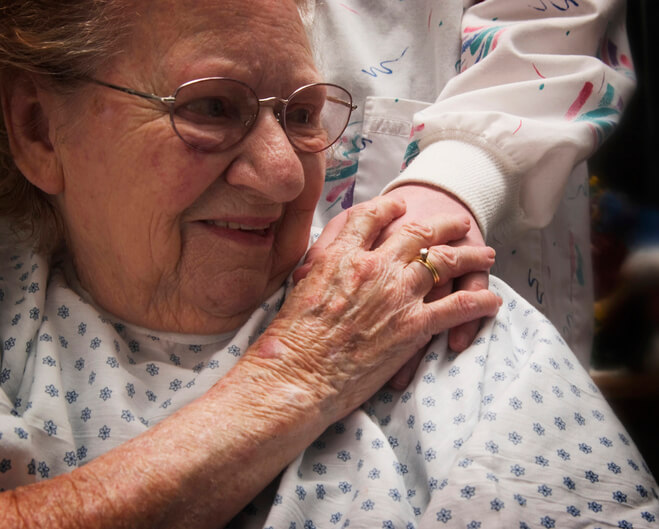How Is Palliative Care Different from Hospice?

Palliative care and hospice care are related in their goal of providing patients who have a serious illness with compassionate measures that address their physical, emotional and spiritual needs. However, they are distinct areas of medical practice.
Understanding when each is typically used is helpful for people needing these types of care. This article provides an overview of the palliative care/hospice difference.
What Is Hospice vs. Palliative Care?
When healthcare providers define palliative vs. hospice care, we start by noting that both are compassionate care for people facing significant health challenges. The primary difference is that palliative care occurs along with curative care, as described below.
What Is Hospice Care?
Hospice care is focused on assisting terminally ill patients in the last six months of life when treatment of their illness is no longer effective and has been discontinued. It can include a wide range of actions, including medical assistance, like administering medication and helping with bathing and dressing.
This type of care is available at a medical facility or as home hospice care. The goal is to enable the person to live life to the fullest while helping loved ones face this trying time and, ultimately, get closure.
What Is Palliative Care?
Palliative care, which is always a component of hospice care, may also be used to relieve symptoms in situations where a patient is still receiving treatment for their illness. The only difference with palliative care is that the patient can continue with curative treatment while receiving these services.
With palliative care, the goal is to assist patients and families with the various aspects of chronic or serious illnesses. Those issues can include physical problems, emotional and social challenges, spiritual issues and practical problems like the financial and legal ramifications of long-term illnesses.
Difference in Palliative Care and Hospice Eligibility
Palliative care is employed to improve the quality of life for people with a wide variety of illnesses, including:
- Cancer
- Alzheimer’s disease
- Kidney disease
- Amyotrophic Lateral Sclerosis (ALS)
- Congestive heart failure
- Chronic obstructive pulmonary disease (COPD)
- Parkinson’s disease
Hospice care is for people who are reaching the end of their life as a result of the conditions above and others, including:
- End-stage liver disease
- Stroke with irreversible brain damage
- Advanced dementia
- Advance multiple sclerosis
Patients are typically eligible for hospice care when they have a prognosis of six months or less to live. That determination is generally made by the patient’s healthcare provider in collaboration with the hospice medical director.
| Feature | Palliative Care | Hospice Care |
|---|---|---|
| Focus | Relieving the symptoms and stress of a serious illness | Comfort and quality of life for individuals with a terminal illness |
| Illness stage | Any stage of a serious illness, including diagnosis | Terminal illness, generally with a prognosis of six months or less |
| Curative treatment | Can be provided alongside curative treatments | Curative treatments are typically discontinued |
| Eligibility | Available to anyone with a serious illness | Requires a physician's certification of a terminal illness |
| Payment | Might be covered by insurance, Medicare or Medicaid; it is crucial to research your benefits | Might be covered by insurance, Medicare or Medicaid; it is crucial to research your benefits |
Do Palliative Care and Hospice Have Different Care Teams?
Another area where there is a small difference in palliative care/hospice is staffing. Both may be administered by a team of professionals, including doctors, nurses, dietitians, social workers, psychologists, massage therapists, religious leaders and volunteers. However, hospice teams tend to have a larger volunteer presence. Volunteers are thoroughly trained to provide several types of support, including practical assistance (errands, light housekeeping, etc.), companionship and emotional support.
Explore Palliative Care and Home Hospice Services From Baptist Health
If you or a loved one is facing severe health issues or a terminal illness, we can help. Learn about palliative care and home hospice care on our website and by talking with your Baptist Health provider.



